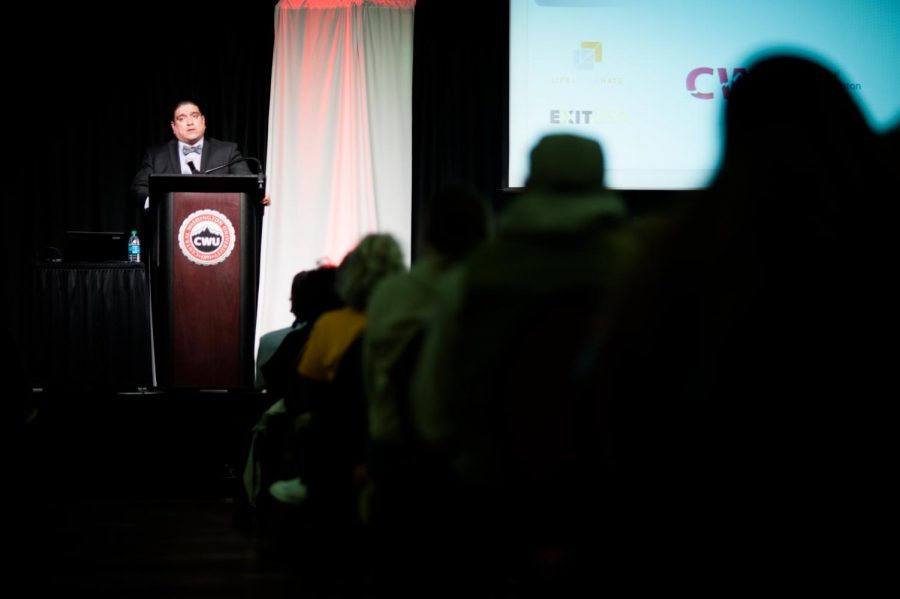No more hate
Founder of anti-hate organization recounts his extremist past and what lead him to safety
Life After Hate founder Sammy Rangel speaks to a large crowd of community members in the SURC Ballroom.
March 6, 2018
Sammy Rangel went from an abusive household to foster homes and group homes until he fully self-destructed and ended up in prison. In front of a large crowd in the Student Union and Recreation Center Ballroom last Thursday, Feb. 22, Rangel disclosed the story that lead him to where he was now. Even in his early years when there were obvious signs of neglect and abuse at home, no one in his life asked questions about his home life.
Rangel, founder of Life After Hate and author of “Fourbears: Myths of Forgiveness,” was raised in an unhealthy home environment with no positive role models. Within a week of leaving home, the then 11-year-old Rangel entered a gang. During the duration of time that he was in this gang, he made many mistakes that eventually led him to prison.
Rangel got more time added to his sentence during a racial riot that broke out while he was in prison. As a person of color, he found that the white supremacist inmates made up the majority of the prison and caused conflicts, which is what led to the riot. That was when the months of prison time Rangel was facing turned into years.
Hate became an every day emotion for Rangel. He went from prison to prison, due to his actions which were fueled by hate.
Rangel eventually ended up in solitary confinement, or what he referred to as “the basement,” where he was strapped to a metal plate and fed dehydrated bread for many months. The longer he was in prison, the more inhumane and unconstitutional he found each institution to be.
“I was completely at peace within my hate,” Rangel said.
What turned Rangel’s hate into compassion was something very simple. One day while he was in “the basement,” he heard a sound that you never hear in prison: a knock.
Following the knock came a man’s voice that said, “I’d like to tell you a story.”
After mulling over the story for a few days, Rangel realized that in all his years he had never been told a story before. In that moment, something clicked.
“No one is irredeemable or incorrigible,” Rangel said.
As a former extremist himself, Rangel is passionate about changing the minds of the alt-right by means of compassion and open-mindedness. .
“Hear out the other side in order to know how to infiltrate and change the other side,” Rangel said. “The way to dismantle is to talk first. Step back and try to understand what this person [and] these groups are trying to communicate.”
Rangel founded Formers Anonymous, a 12-step self-help program that helps those who wish to exit a life of crime and violence. He also has a program through Life After Hate called “ExitUSA,” which helps those involved in extremist groups exit the group.
Rangel is currently working on the project #WeCounterHate. This project became possible when Possible, a Seattle company, reached out to Life After Hate.
Social media makes spreading any kind of message much easier than in the past. Unfortunately, this also means that it is much easier to spread hateful messages.
“We gave hate the retweet button,” Rangel said.
Using high tech computers, the program #WeCounterHate detects hate posts on Twitter. Every time that the post is retweeted, #WeCounterHate sends a message that says a $1 donation will be made to Life After Hate from the person who tweeted the hateful words. The message usually either leads to the deletion of the original tweet itself or stops people from retweeting it.
“You can condemn an act without condemning a person,” Rangel said. “It is not our job to determine whether someone is worthy or not.”



